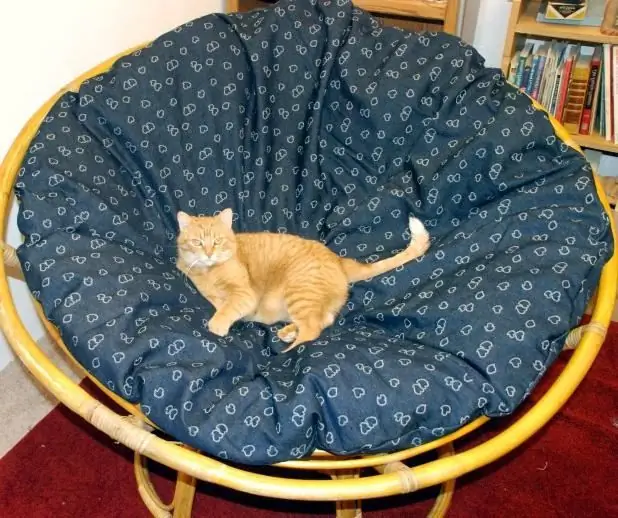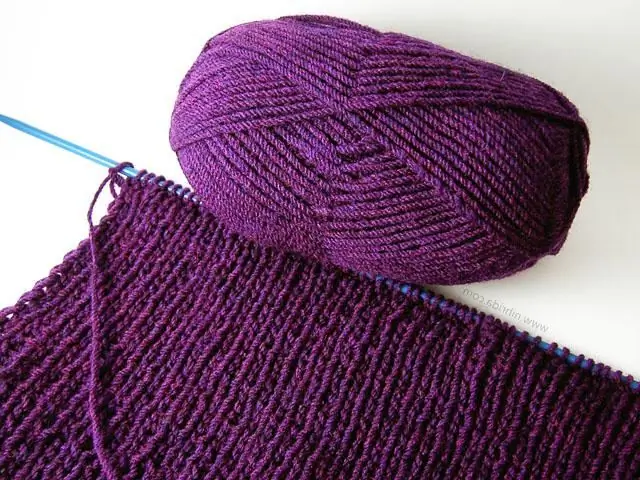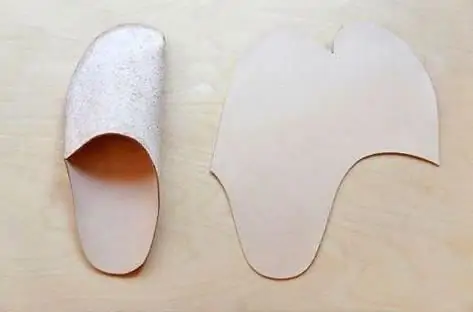
Table of contents:
- From what you can knit an ottoman
- What tool are ottomans made of
- What to put inside
- How to save on filler
- Pouf from bottles
- Determination of the dimensions of the intended product
- Knitting patterns for ottoman
- Preparing a pattern fragment
- Knitting an ottoman with knitting needles
- We are making a cover that can be washed
- Crochet ottoman
- Author Sierra Becker becker@designhomebox.com.
- Public 2024-02-26 03:47.
- Last modified 2025-01-22 22:09.
Eminent designers say that various small details complete the interior. Therefore, in the material presented below, we study the technology of making knitted ottomans with our own hands. This interesting item can fit into almost any room ensemble, giving it a cozy feel.
From what you can knit an ottoman
Before you implement the idea, you need to prepare. First of all, buy yarn. Experienced needlewomen say that you can knit the product under study with any knitting thread. However, it is better to give preference to denser and thicker woolen yarn. And the band is also perfect.
In addition, many creative people knit the studied interior items from old clothes. It should first be cut into strips a finger wide, tied and twisted into a skein. You can also make a knitted ottoman with your own hands from twine, which is freely available at any hardware store. Or use plastic bags as a material. They should be folded in a pile and cut into rings 2-3 centimeters wide. Then fasten together and also wind into a ball.
In any case, the choice of material falls entirely on the shoulders of the needlewoman. Therefore, you can select yarn, focusing on your own taste, the wishes of the household and the style of the interior.

What tool are ottomans made of
Not all needlewomen are equally good at knitting and crocheting. Therefore, they do not dare to decorate their home with a knitted ottoman made by their own hands. However, a huge number of master classes compiled by professional knitters prove that you can realize your idea using any tool. But at the same time, it is important to consider that an iron hook and knitting needles are more suitable for ordinary knitting thread. The size should be equal to the thickness of the yarn. But to work with twine, clothesline or other dense yarn, you should purchase a wooden tool.
What to put inside
Another important and difficult issue that beginners often fail to cope with is filler. After all, we will only make a cover. Therefore, the question of how to fill a knitted ottoman will turn into a serious stumbling block for many. However, experienced craftsmen say that literally anything can be used.
And indeed, materials that can be purchased at the store can act as a filler. Or obsolete clothes, towels and other things made of fabric material. In addition, it is permissible to fill the ottoman with the contents of the pillow. And even feather. If you don't even wantload yourself with difficult questions, you can put an unnecessary blanket inside the cover.

How to save on filler
Very many needlewomen, thinking about how to fill a knitted ottoman, come to the conclusion that they cannot find the required number of unnecessary things. Really in this case it is necessary to refuse the embodiment of the idea? Professional knitters shake their heads. And they offer a rather original alternative. The idea is quite simple, but requires the preparation of twenty plastic bottles of the same size. The pictured version uses two-liter Coca-Cola eggplants.
Pouf from bottles
First of all, carefully cut off the necks of ten bottles. We put the rest on the whole bottle. As a result, we get ten "matryoshkas". We expose them, forming a circle. Two pieces in the first row, then two rows of three and again two. Wrap the construction well with adhesive tape.
We take a suitable size box from any equipment. We draw an ottoman on it twice, outlining circles. Cut and glue on the bottom and top of the structure. Then we wrap it with an old blanket and prepare a knitted cover for our product. So, we manage to make a knitted ottoman with our own hands!
We used to look at plastic containers as garbage. However, needlewomen prove that in experienced hands this material turns into a useful and original thing.

Determination of the dimensions of the intended product
Toto tie an ottoman, you need to clearly determine the size. To do this, we calculate the parameters of our idea. If a frame is prepared from plastic bottles, we measure the distance from the center of the upper circle through the side wall to the center of the lower circle. This is the length of the case.
Then determine the radius of the seat or bottom - from the center of the circle to the side. Thus, we find out the distance during which we will first need to make an increase, and then a decrease. And you should also measure the diameter of the circle or the girth of the ottoman. This is the width of the cover. The manipulations described above must be performed for all the master classes "Knitted ottoman with your own hands", explaining the technology of doing work using knitting needles and a hook. If the needlewoman plans to fill the prepared case with soft filler, you can specify the parameters of interest offhand.
Knitting patterns for ottoman

As we mentioned earlier, you can knit the studied piece of furniture both with knitting needles and with a hook. Even professional knitters do not dare to say which tool is better. Therefore, in the article we will study both technologies so that the reader can choose for himself. Let's start with making a knitted ottoman with knitting needles with your own hands. For such work, you must select a pattern. Most often, craftswomen prefer a simple front surface. When only front loops are knitted on one side, and only purl loops on the other. Although, if desired, you can also add a canvas with braids and plaits. It is interesting to look at products connected with garter stitch, whichimplies knitting front loops on both sides of the fabric.
Preparing a pattern fragment
Having decided on the pattern, we are preparing a sample. To make an ottoman, a square with a side of ten centimeters is enough. After that, we carefully consider how many loops and rows turned out. We designate the first parameter with the letter P, the second - R.
Divide the estimated width of the cover by ten and multiply by the value of P. The final number is written down. Divide the radius of the seat by ten and multiply by the value of R. We also write down the result. And finally, we divide the length of the cover by ten and multiply by the value of P. We also fix this parameter on paper. With the help of simple mathematical calculations, we manage to convert centimeters into loops and rows. Now we can get started based on our parameters.
Knitting an ottoman with knitting needles

Experienced needlewomen note that it is a little easier to make a crocheted ottoman with your own hands than with knitting needles. Because it will be possible to check with the centimeter from time to time. But novice masters are convinced that by making calculations in advance, it is much easier to knit. You can completely immerse yourself in an interesting or complex pattern and not be distracted by taking measurements. We advise the reader to try both technologies, and then choose the most preferable for themselves. Each version of the ottoman looks very impressive.
But let's not get distracted and start a step-by-step master class:
- First of all, cast on a chain of five loops.
- Close into a ring and just knit the first row.
- Wothe second is to double the number of loops. After each loop, add air.
- Subtract ten from the loops equal to the width of the cover. And divide the resulting value by the radius of the seat (in rows). So, we find out how many loops need to be added in each next row.
- After that, back to work. We expand our canvas to the desired size. Experienced craftsmen recommend recording each action, because, by analogy, you will have to reduce the loops.
- Then we knit a cover without increases and decreases, covering the sides of the ottoman.
- We put the cover on the frame or stuff it with filler.
- And complete the work based on our notes.
- There should be 10 sts left at the end.
- They should be reduced to five.
- Cut yarn off and pull through remaining sts.
We are making a cover that can be washed

We decided how to fill a knitted ottoman. With our own hands, we managed to bring the idea to life. However, a new question has now arisen. How to wash a cover that will certainly get dirty over time? Professional craftsmen recommend that you take care of this in advance so that you do not have to redo your creation in the future.
You only need to purchase a zipper, the length of which is equal to the circumference of the conceived ottoman. After that, you need to tie the seat and sides of the desired product. And make the bottom separately. The technology is the same, but first you need to dial the number of loops equal to the width of the cover. Then carefully sew the zipper to the bottom,and then to the main part. And finally, we put a cover on the frame or stuff it well with the selected material or unnecessary rags.
Crochet ottoman

If the reader is better controlled by the tool noted in the title of the current paragraph, then we offer a detailed master class. However, first it is necessary to make a reservation that traditionally the cover for the ottoman is knitted with single crochets. Although you can also make it openwork. But in this case, you need to prepare the lining. Experienced needlewomen recommend making it in a contrasting color. Then the cover will advantageously highlight, and the product itself will look even more original.
So, making a crochet ottoman is very simple. But you have to start right. Therefore, we advise the reader to follow each step of our instructions. First of all, wind the prepared yarn around any two fingers of the left hand. As a result of such actions, we will get a loop, which must be carefully removed and tied with six single crochets.
Next, gently pull the initial tip and tighten the center of the circle. After completing these manipulations, we proceed to the implementation of our idea. In this case, you do not need to be guided by strict technology or write down your every step. We will simply knit in a spiral, adding new loops from time to time, and forming an even circle. Having reached the desired size, we knit a "pipe" without adding or decreasing loops.
The final stage is adjustable at will. If you want to make a one-piece ottoman, subtractbottom loops. Or we make an ottoman from two parts, and then we connect it with a zipper.
As you can see, even a novice master can make a knitted ottoman with his own hands with a crochet or knitting needles almost without difficulty. You just need to approach the task creatively, and then the process will certainly bring a lot of pleasure.
Recommended:
How to make a chair with your own hands. How to make a rocking chair with your own hands

Furniture can be made not only from boards, but also from any available material. The only question is how strong, reliable and durable it will be. Consider how to make a chair with your own hands from plastic bottles, cardboard, wine corks, hoop and thread
How to make a Santa Claus costume with your own hands? How to sew a Snow Maiden costume with your own hands?

With the help of costumes, you can give the holiday the necessary atmosphere. For example, what images are associated with such a wonderful and beloved New Year holiday? Of course, with Santa Claus and the Snow Maiden. So why not give yourself an unforgettable holiday and sew costumes with your own hands?
New things from old things with your own hands. Knitting from old things. Remaking old things with your own hands

Knitting is an exciting process with which you can create new and beautiful products. For knitting, you can use threads that are obtained from old unnecessary things
How to make knitted tank slippers with your own hands? Tank slippers: crochet pattern and master class

Choosing a gift for a man is a very complex and lengthy process. If you know how to knit, then the problems become much less, because with your own hands you can make an original surprise that will appeal to any member of the stronger sex. The main thing is desire, patience and perseverance. Do-it-yourself slippers-tanks will appeal to both small and adult men in your family
Pattern of slippers with your own hands. How to sew children's house slippers with your own hands?

Shoes such as slippers are relevant at any time of the year. In summer, the foot in them rests from sandals, and in winter they do not allow to freeze. We suggest you make homemade slippers with your own hands. A pattern is included with every tutorial
